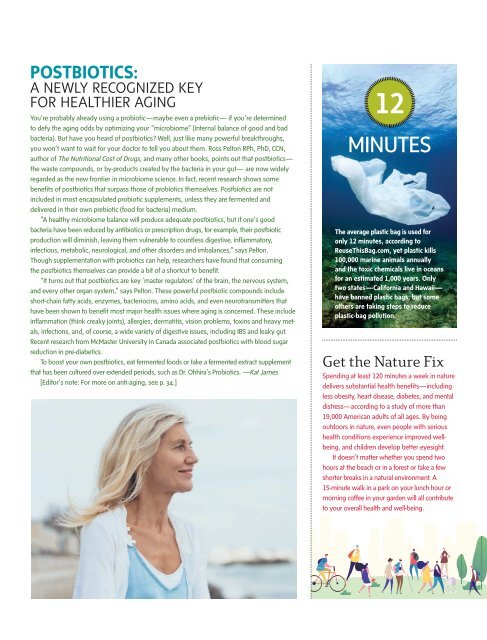You also want an ePaper? Increase the reach of your titles
YUMPU automatically turns print PDFs into web optimized ePapers that Google loves.
POSTBIOTICS:<br />
A NEWLY RECOGNIZED KEY<br />
FOR HEALTHIER AGING<br />
You’re probably already using a probiotic—maybe even a prebiotic— if you’re determined<br />
to defy the aging odds by optimizing your “microbiome” (internal balance of good and bad<br />
bacteria). But have you heard of postbiotics? Well, just like many powerful breakthroughs,<br />
you won’t want to wait for your doctor to tell you about them. Ross Pelton RPh, PhD, CCN,<br />
author of The <strong>Nutrition</strong>al Cost of Drugs, and many other books, points out that postbiotics—<br />
the waste compounds, or by-products created by the bacteria in your gut— are now widely<br />
regarded as the new frontier in microbiome science. In fact, recent research shows some<br />
benefits of postbiotics that surpass those of probiotics themselves. Postbiotics are not<br />
included in most encapsulated probiotic supplements, unless they are fermented and<br />
delivered in their own prebiotic (food for bacteria) medium.<br />
“A healthy microbiome balance will produce adequate postbiotics, but if one’s good<br />
bacteria have been reduced by antibiotics or prescription drugs, for example, their postbiotic<br />
production will diminish, leaving them vulnerable to countless digestive, inflammatory,<br />
infectious, metabolic, neurological, and other disorders and imbalances,” says Pelton.<br />
Though supplementation with probiotics can help, researchers have found that consuming<br />
the postbiotics themselves can provide a bit of a shortcut to benefit.<br />
“It turns out that postbiotics are key ‘master regulators’ of the brain, the nervous system,<br />
and every other organ system,” says Pelton. These powerful postbiotic compounds include<br />
short-chain fatty acids, enzymes, bacteriocins, amino acids, and even neurotransmitters that<br />
have been shown to benefit most major health issues where aging is concerned. These include<br />
inflammation (think creaky joints), allergies, dermatitis, vision problems, toxins and heavy metals,<br />
infections, and, of course, a wide variety of digestive issues, including IBS and leaky gut.<br />
Recent research from McMaster University in Canada associated postbiotics with blood sugar<br />
reduction in pre-diabetics.<br />
To boost your own postbiotics, eat fermented foods or take a fermented extract supplement<br />
that has been cultured over extended periods, such as Dr. Ohhira’s Probiotics. —Kat James<br />
[Editor’s note: For more on anti-aging, see p. 34.]<br />
12<br />
MINUTES<br />
The average plastic bag is used for<br />
only 12 minutes, according to<br />
ReuseThisBag.com, yet plastic kills<br />
100,000 marine animals annually<br />
and the toxic chemicals live in oceans<br />
for an estimated 1,000 years. Only<br />
two states—California and Hawaii—<br />
have banned plastic bags, but some<br />
others are taking steps to reduce<br />
plastic-bag pollution.<br />
Get the Nature Fix<br />
Spending at least 120 minutes a week in nature<br />
delivers substantial health benefits—including<br />
less obesity, heart disease, diabetes, and mental<br />
distress—according to a study of more than<br />
19,000 American adults of all ages. By being<br />
outdoors in nature, even people with serious<br />
health conditions experience improved wellbeing,<br />
and children develop better eyesight.<br />
It doesn’t matter whether you spend two<br />
hours at the beach or in a forest or take a few<br />
shorter breaks in a natural environment. A<br />
15-minute walk in a park on your lunch hour or<br />
morning coffee in your garden will all contribute<br />
to your overall health and well-being.

















